

|
 Books to buy… 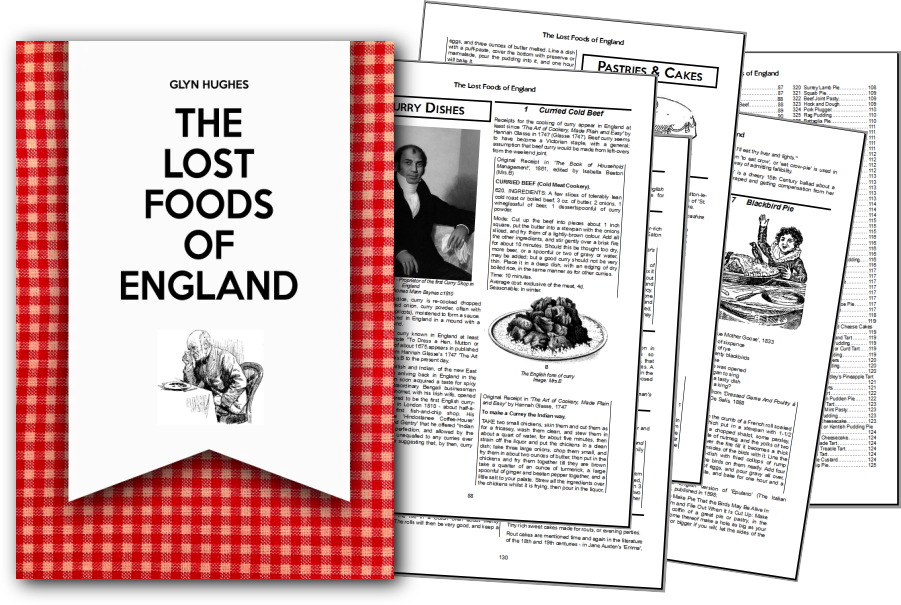 The Lost Foods of England The great big, great-grandmother of all cookbooks. English food as it once was, from Growlers and Wet Nelly to Bakewell Pudding and Plum Jerkum. The foods we’ve lost and forgot, with more than one thousand original receipts to make them. Available in print or as an e-book. ISBN: 9780244029630 More Books from Foods of England… The Foods of England website holds the complete texts of dozens of cook books from that of the master-cooks of King Richard II in the 14th Century right up to Mrs Beeton and Escoffier. The Forme of Cury 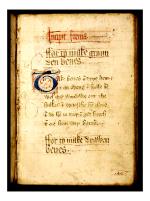 By the Chief Master-Cook of King Richard II, c1390 (Cury 1390) A vellum roll written in late Middle English, transcribed in 1791 by the historian the Rev. Samuel Pegge, who gave it the name used now. ‘Cury’, an olde version of the word ‘cookery’, was, we rather suspect, pronounced ‘Ku-Ury’. Receipts and excerpts included inThe Foods of England have had their spellings modernised, but the many mysterious words are left as they are. Receipts include; Aquapatys, Bacon and Beans, Blank Maunger, Brasey, Buckenade, Bursews, Sauce Madame, Soup Dorye, Spinee  Text online at: FoodsOfEngland.co.uk Text online at: FoodsOfEngland.co.ukThe Vision of Piers Plowman By William Langland, c1390 (Langland 1390) A Middle English allegorical narrative poem with many references to the everyday lives and foods of the times including Blancmange, Collops, Mortress, Peasecods, Wafers and Wastel Bread  Online at: archive.org Online at: archive.orgLiber cure cocorum 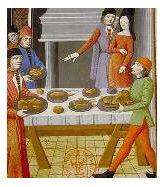 Anonymous around 1430 (Liber Cure 1430) A very curious cookery book in verse from the North West of Lancashire dated to around 1430. It was first printed as a transcript made by Richard Morris in 1862 from a text discovered in the Sloane Manuscript Collection. The poem includes the earliest references to several dishes, including haggis. Excerpts here are from Cindy Renfrow’s translation into modern English.  Online at: FoodsOfEngland.co.uk Online at: FoodsOfEngland.co.ukTwo 15th Century Cookbooks Anonymous around 1440 (Austin 1440) Transcriptions done in 1888 by Thomas Austin of two manuscripts in the Harleian Collection, plus bits of food stuff from other ancient sources.  Online at: FoodsOfEngland.co.uk Online at: FoodsOfEngland.co.ukA Noble boke off cookry ffor a prynce houssolde or eny other estately houssolde Anonymous around 1480 (Noble Boke 1480) The text of a manuscript from Holkham Hall, prepared by Mrs. Alexander Napier in 1882. Online at FoodsOfEngland.co.uk A Proper newe Booke of Cokerye 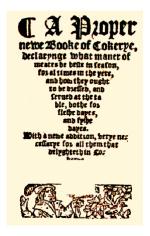 Anonymous around 1550 (Proper Booke 1550) A transcription of a cookbook in the possession of Matthew Parker, Archbishop of Canterbury from 1559 until 1575. Sub-titled “declarynge what maner of meates be beste in season, for al times in the yere, and how they ought to be dressed, and served at the table, bothe for fleshe dayes, and fyshe dayes. With a newe addition, verye necessarye for all them that delyghteth in Cokerye.”  Online at: uni-giessen.de Online at: uni-giessen.deA book of cookrye. Very necessary for all such as delight therin. Gathered by “AW” (AW 1591) Subtitled; “And now newlye enlarged with the serving in of the Table. With the proper Sauces to each of them convenient.” Printed and published in London by Edward Allde  Online at: jducoeur.org Online at: jducoeur.orgThe Good Huswifes Handmaide for the Kitchin 1594 The Good Huswifes Jewell 1596 By Thomas Dawson, 1594 (Huswife 1594, 1596) Dawson wrote several books of cookery and household hints including ‘The Booke of Carving and Sewing’. Excerpts here from the ‘Huswifes’s Jewell’ are from the version edited by G. Steevens in 1596.  ‘Good Huswifes Handmaide’ online at: FoodsOfEngland.co.uk ‘Good Huswifes Handmaide’ online at: FoodsOfEngland.co.uk ‘Huswifes Jewel’ online at: medievalcookery.com ‘Huswifes Jewel’ online at: medievalcookery.comGreat Herball, or General Histoire of Plantes By John Gerard, 1597 (Gerard 1597) Still one of the standard works on herbs and traditional herbal medicines.  Online at: archive.org Online at: archive.orgThe Arte of Preserving Conserving, Candying &c; By Hugh Plat, 1609 (Plat 1609) Plat, the son of a brewer, wrote extensively on ‘ladies concerns’, domestic economy, as well as on his invention of assorted new methods of ironfounding and making synthetic fuels.  Online at: havaris.ca Online at: havaris.caCountrey Contentments, or, The English Hus-wife 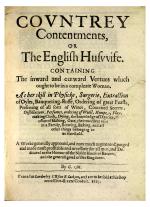 By Gervase Markham, 1615 (Markham 1615) The ‘Hus-Wife’ was a companion volume to his book ‘The English Husbandman’, on farming techniques. Markham may have been a soldier, and is reputed to have imported te first Arab horse into England.  Online at: Foods of England.co.uk Online at: Foods of England.co.ukA New Booke of Cookerie 1615 A Daily Exercise for Ladies and Gentlewomen 1617 Two Books of Cookerie and Carving 1638 By John Murrell (Murrell 1617 etc)  New Booke of Cookerie online at: FoodsOfEngland.co.uk New Booke of Cookerie online at: FoodsOfEngland.co.ukA True Gentlewomans Delight By ‘WJ’, 1653 (Gent.Delight 1653) A true gentlewomans delight Wherein is contained all manner of cookery: together with preserving, conserving, drying and candying. Very necessary for all ladies and gentlewomen. Published by W. I. gent. By Kent, Elizabeth Grey, Countess of, 1581-1651., ‘W. J.’ Online at The University of Michigan Library:  https://quod.lib.umich.edu/e/eebo/A47270.0001.001/1:2?rgn=div1;view=fulltext https://quod.lib.umich.edu/e/eebo/A47270.0001.001/1:2?rgn=div1;view=fulltextThe Cooks Guide: Or, Rare Receipts for Cookery Published in 1654 (C.Guide 1654)  No online edition known No online edition knownArchimagirus anglo-gallicus Anonymous (possibly Sir Theodore Turquet de Mayerne) 1658 (Archi 1658)  No online edition known No online edition knownThe Compleat Cook By ‘WM, 1658 (WM 1658)  Online at: FoodsOfEngland.co.uk Online at: FoodsOfEngland.co.ukA Queens Delight in The Art of Preserving, Conserving and Candying By WM, 1671 (WM 1671)  Online at: FoodsOfEngland.co.uk Online at: FoodsOfEngland.co.ukIt is not clear who ‘WM’ was, nor if the two books ascribed to him are by the same person. The Accomplisht Cook 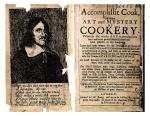 By Robert May, 1660 (Robert May 1660) Subtitled: “The art & mystery of cookery. Wherein the whole art is revealed in a more easie and perfect method, than hath been publisht in any language.” May, from Wing in Buckinghamshire, worked as master-cook to many noble households in the years before the Civil War. His book is often considered one of the first by a professional to try to explain the whole art of cooking. Excerpts are from the 1685 edition.  Online at: FoodsOfEngland.co.uk Online at: FoodsOfEngland.co.ukThe whole Body of Cookery Dissected By William Rabisha, 1661 (Rabisha. 1661) Facsimile online at:  https://www.loc.gov/item/44028918/ https://www.loc.gov/item/44028918/The Closet Of Sir Kenelm Digby Knight, Opened 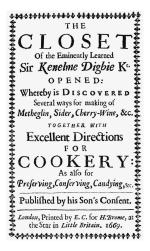 (Digby 1669) Digby was a prodigiously capable natural philosopher who also happened to own a glass works and may have invented the wine bottle. Published in 1669, shortly after his death this, probably spurious, book includes a huge number of receipts for mead and cider drinks as well as general cookery.  Online at: FoodsOfEngland.co.uk Online at: FoodsOfEngland.co.ukThe English and French Cook By “TPJPRCNB” 1674 (TPJPRCNB 1674)  No online edition known No online edition knownThe Accomplish’d Lady’s Delight In Preserving (1677) 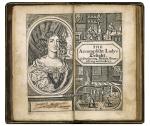 The Compleat Servant-Maid; Or, The Young Maidens Tutor (1677) The cook’s guide: or, Rare receipts for cookery (1664) The Queene-Like Closet (1672) By Hannah Woolley (Wooley 1672 etc) Hannah Wooley came from a family of surgeons, and may well be the first Englishwoman to have earned a living by food writing.  ‘The Queene-Like Closet’ online at: FoodsOfEngland.co.uk ‘The Queene-Like Closet’ online at: FoodsOfEngland.co.uk ‘The cook’s guide: or, Rare receipts for cookery’ online at: FoodsOfEngland.co.uk ‘The cook’s guide: or, Rare receipts for cookery’ online at: FoodsOfEngland.co.uk ‘Accomplish’d Lady’s Delight’ online at: FoodsOfEngland.co.uk ‘Accomplish’d Lady’s Delight’ online at: FoodsOfEngland.co.ukThe Whole Duty of a Woman: or a Guide to the Female Sex By Lady Mary Cressy (Cressy 1696) This book was one of many general-advice ‘conduct manuals’ circulating at the time.  No online edition known No online edition knownAcetaria: A Discourse of Sallets By John Evelyn (Evelyn 1699) John Evelyn was a noted diarist and prolific author on a huge range of subjects.  Online at: FoodsOfEngland.co.uk Online at: FoodsOfEngland.co.uk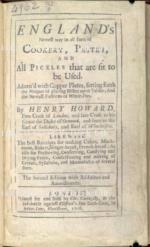 England’s newest way in Cookery By Henry Howard (Howard 1703) “England’s newest way in all sorts of cookery, pastry, and all pickles that are fit to be used.” The author was cook to the Duke of Ormond, the Earl of Salisbury and the Earl of Winchester, though the book is one of the first to laud the celebrity of the cook, rather than of his patrons.. The third edition, produced in 1710, states that many of the receipts were “extracted out of Choice Manuscripts of several Ladies who were particularly Excellent in Cookery and beautifying the Face.”  Online at: Foods of England Online at: Foods of EnglandMrs. Mary Eales’s receipts By Mary Eales (Eales 1718) Mary Eales claimed to be “Confectioner to her late Majesty Queen Anne”, her book contains many receipts for preserving, for jams, jellies, biscuits and the first known receipt in England for ice-cream  Online at: FoodsOfEngland.co.uk Online at: FoodsOfEngland.co.uk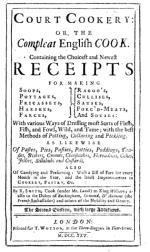 Court cookery: or, The compleat English cook By Robert Smith (Smith 1725) “The latest improvements in pastry, cookery etc” by “R. Smith, Cook (under Mr Lamb) to King William, also to the dukes of Buckingham, Ormond, D’Aumont (the French Ambasador) and others of the Nobility and Gentry.” Smith points out that his book does not contain the time-wasting nonsense of receipts for face creams or cleaning aids favoured by his celebrity cook rival Henry Howard (Howard 1703)  Online at: Google Online at: GoogleThe Cook’s and Confectioners Dictionary: Or, the Accomplish’d Housewife’s Companion. By John Nott (Nott 1723) Nott was master-cook to the Duke of Bolton and his popular and influential book went through several editions.  Online at: FoodsOfEngland.co.uk Online at: FoodsOfEngland.co.ukA Learned Dissertation on Dumpling (Dumpling 1726) An anonymous humorous paper, subtitled “its Dignity, Antiquity, and Excellence, with a Word upon PUDDING, and Many other Useful Discoveries, of great Benefit to the Publick”, published in London, but with some useful information on the pudding practices of the time.  Online at: FoodsOfEngland.co.uk Online at: FoodsOfEngland.co.ukThe Country Housewife and Lady’s Director By Prof. R Bradley, 1728 (Bradley 1728) Richard Bradley was a botanist at Cambridge University and Fellow of the Royal Society with a particular interest in exotic plants, including the pineapple. He was involved in some sort of financial mismanagement and dismissed from service as horticultural advisor to the Cannons Estate in Middlesex.  Online at: FoodsOfEngland.co.uk Online at: FoodsOfEngland.co.ukThe Compleat Housewife By Eliza Smith 1727, this version 1739 The compleat housewife: or, accomplish’d gentlewoman’s companion: being a collection of recipts in cookery etc. to which is added a collection of receipts of medicines  Online at: FoodsOfEngland.co.uk Online at: FoodsOfEngland.co.uk The Complete family-piece and country gentleman and farmer’s best guide (Family Guide 1747) A 600-page compendium of receipts for medicines, foods and household cleaners, together with advice on hunting and household management. Published in London.  Online at: google books Online at: google booksThe Lady’s Companion (Ladys Companion 1753) The lady’s companion.: Containing upwards of three thousand different receipts in every kind of cookery: and those the best and most fashionable; being four times the quantity of any book of this sort … To which is added, bills of fare for every month in the year. Also, directions for brewing beers, ales, &c.;, making all sorts of English wines, cyder, mum, metheglin, vinegar, verjuice, catchup, &c..; Published in London.  Online: The Lady’s Companion, 1753 Online: The Lady’s Companion, 1753English Housewifry By Elizabeth Moxon, 1764 (Moxon 1764)  Online at: FoodsOfEngland.co.uk Online at: FoodsOfEngland.co.ukThe Art of Cookery, Made Plain and Easy By Hannah Glasse, 1747 (Glasse 1747) This hugely popular cookbook went through 26 editions in its day. Mrs Glasse, though, found herself in debtor’s prison when her dressmaking business went bankrupt and she had to sell the copyright to her cookery book. It is famous for the line “Hare Soup. First catch your hare…”, but these words occur in no edition I can find.  Online at: FoodsOfEngland.co.uk Online at: FoodsOfEngland.co.ukA new and easy method of cookery By Elizabeth Cleland (Cleland 1755)  Online at: Google books Online at: Google booksThe lady’s assistant for regulating and supplying her table By Charlotte Mason (Mason 1777)  Online at: FoodsOfEngland.co.uk Online at: FoodsOfEngland.co.uk The experienced English housekeeper 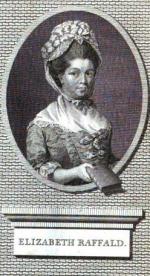 By Elizabeth Raffald, 1769 (Raffald 1769) Elizabeth met her husband while working as housekeeper to the Warburtons of Arley Hall in Cheshire. The couple moved to Manchester, where Elizabeth ran a confectionery shop and John sold plants at a market stall. They had 16 children, all daughters. The Experienced English Housekeeper went through at least 13 authorised editions and perhaps 23 pirated ones. In 1773, she sold the copyright to her publisher for £1400, a huge sum for the time.  Online at: FoodsOfEngland.co.uk Online at: FoodsOfEngland.co.ukThe English Art of Cookery By Richard Briggs, 1789 (Briggs 1788) Briggs was sometime master-cook at the Globe Tavern, Fleet Street.  Online at: FoodsOfEngland.co.uk Online at: FoodsOfEngland.co.ukThe Complete Confectioner (Nutt 1789) and The Imperial and Royal Cook (Nutt 1809) By Frederick Nutt Nutt had been apprenticed to the Italian Domenico Negri whose ‘Pot and Pineapple’ confectioner’s shop in London’s Berkeley Square was one of the first to popularise ice cream in England.  Complete Confectioner online at: FoodsOfEngland.co.uk Complete Confectioner online at: FoodsOfEngland.co.uk Imperial and Royal Cook online at: FoodsOfEngland.co.uk Imperial and Royal Cook online at: FoodsOfEngland.co.ukThe honours of the table By John Trusler, 1791 (Trusler 1791) “The honours of the table, or, Rules for behaviour during meals : with the whole art of carving, illustrated by a variety of cuts. Together with directions for going to market, and the method of distinguishing good provisions from bad; to which is added a number of hints or concise lessons for the improvement of youth, on all occasions in life”.  Online at: FoodsOfEngland.co.uk Online at: FoodsOfEngland.co.ukThe Art of Cookery Made Easy and Refined By John Mollard, 1802 (Mollard 1802) “Comprising ample directions for preparing every article requisite for furnishing the tables of the nobleman, gentleman, and tradesman”.  Online at: FoodsOfEngland.co.uk Online at: FoodsOfEngland.co.ukA New System Of Domestic Cookery By ‘A Lady’ (Mrs. Maria Eliza Ketelby Rundell) (Rundell 1807) Subtitled: ‘Formed On The Principles Of Economy, and Adapted To The Use Of Private Families‘. An extremely popular cookbook, much favoured in the colonies. It went through several editions, later ones being edited and rewritten by Mrs. E Birch.  Online at: FoodsOfEngland.co.uk Online at: FoodsOfEngland.co.ukThe London art of cookery and domestic housekeeper’s complete assistant’ By John Farley (Farley 1811)  Online at: FoodsOfEngland.co.uk Online at: FoodsOfEngland.co.ukModern domestic cookery, and useful receipt book By Elizabeth Hammond (Hammond 1819)  Online at: FoodsOfEngland.co.uk Online at: FoodsOfEngland.co.ukA treatise on the art of brewing By Frederick Accum (Acuum 1820) “Exhibiting the London practice of brewing porter, brown stout, ale, table beer and various other kinds of malt liquors”  Online at: FoodsOfEngland.co.uk Online at: FoodsOfEngland.co.ukVegetable cookery “Vegetable cookery, with an introduction, recommending abstinence from animal food and intoxicating liquors” By Martha Brotherton (Vegetable 1821)  Online at: FoodsOfEngland.co.uk Online at: FoodsOfEngland.co.uk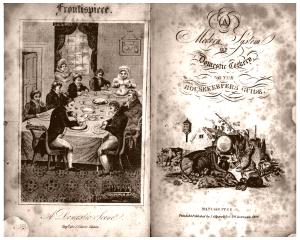 A modern system of domestic cookery, or, The housekeeper’s guide By M Radcliffe. (Radcliffe 1822) Published in Manchester  Online at: FoodsOfEngland.co.uk Online at: FoodsOfEngland.co.ukThe Cook and Housekeeper’s Dictionary by Mary Eaton (Eaton 1822)  Online at: FoodsOfEngland.co.uk Online at: FoodsOfEngland.co.ukSuffolk words and phrases By Edward Moor (1771-1848) (Moor 1823) ‘An attempt to collect the lingual localisms of that county’  Online at: archive.org Online at: archive.orgThe cook and housewife’s Manual By ‘Mrs Margaret Dods’ (Pseud. of Christian Isobel Johnstone) (Johnstone 1828) Online at Foods of England  The Cook and Housewifes Manual, 1828 The Cook and Housewifes Manual, 1828The practice of cookery By Mrs. Dalgairns (Dalgairns 1830) ‘Adapted to the business of every day life’  Online at: archive.org Online at: archive.orgThe Cook’s Oracle By William Kitchiner (Kitchiner 1830) Described as ‘containing receipts for plain cookery, on the most economical plan for private families; containing also a complete system of cookery for Catholic families’, a containing, as well as receipts, a wealthy of cookery anecdotes and observations. William Kitchiner M.D. (1775–1827) was an occulist and famously devoted and eccentric cook who travelled with his ‘portable cabinet of taste’, a collection of his mustards and sauces.  Online at: FoodsOfEngland.co.uk Online at: FoodsOfEngland.co.ukThe Practical Cook, English and Foreign By Joseph Bregion, and Anne Miller, (Bregion & Miller 1847) Subtitled: “Containing a great variety of old receipts, improved and re-modelled; and many original receipts in English, Russian, Dutch, French, Spanish, American, German, Polish, Swiss, and Indian cookery. With with copious directions for the choice of all provisions.”  Online at: FoodsOfEngland.co.uk Online at: FoodsOfEngland.co.ukModern cookery for Private Families (1845) and The English Bread Book(1857) By Eliza Acton Acton, born in Sussex, was one of the first writers to give complete lists of ingredients and their quantities and described her method as being ‘reduced to a system of easy practice’. ‘Modern Cookery’ continued to be updated and re-issued untill well into the 20th Century. She is also slightly famous for her poetry.  ‘Modern cookery for Private Families’ online at: FoodsOfEngland.co.uk ‘Modern cookery for Private Families’ online at: FoodsOfEngland.co.uk ‘The English Bread Book’ online at: FoodsOfEngland.co.uk ‘The English Bread Book’ online at: FoodsOfEngland.co.ukThe Whole Art of Curing, Pickling and Smoking Meat and Fish By James Robinson (Robinson 1847)  Online at: FoodsOfEngland.co.uk Online at: FoodsOfEngland.co.ukA Shilling Cookery for The People (1845) 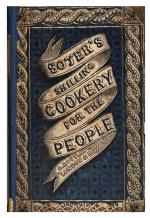 The Gastronomic Regenerator: (1847) and The Modern Housewife (1850) By Alexis Soyer Chief cook at London’s prestigious Reform Club, Soyer was a huge self-publicist and celebrity who marketed his own range of kitchen equipment and bottled sauces.  ‘Shilling Cookery’ online at: FoodsOfEngland.co.uk ‘Shilling Cookery’ online at: FoodsOfEngland.co.uk ‘Gastronomic Regenerator’ online at: FoodsOfEngland.co.uk ‘Gastronomic Regenerator’ online at: FoodsOfEngland.co.uk ‘The Modern Housewife’ online at: FoodsOfEngland.co.uk ‘The Modern Housewife’ online at: FoodsOfEngland.co.ukThe Modern Cook (1846) A Plain Cookery Book for the Working Classes (1852) The Cook’s Guide, and Housekeeper’s & Butler’s Assistant: A Practical Treatise on English and Foreign Cookery (1867) By Charles Elme Francatelli (Francatelli 1846, etc) Of Italian ancestry, Francatelli was, very briefly, chief cook to Queen Victoria, and later, like Soyer, at the Reform Club.  ‘Modern Cook’ online at: FoodsOfEngland.co.uk ‘Modern Cook’ online at: FoodsOfEngland.co.uk ‘Plain Cookery’ online at: FoodsOfEngland.co.uk ‘Plain Cookery’ online at: FoodsOfEngland.co.uk ‘Cook’s Guide’ online at: archive.org ‘Cook’s Guide’ online at: archive.orgThe Frugal Cook By E. Carter (Carter 1851)  Online at: archive.org Online at: archive.orgAn encyclopædia of domestic economy By Thomas Webster and Mrs. William Parkes (Webster 1852)  Online at: archive.org Online at: archive.orgA Dictionary of obsolete and provincial English By Thomas Wright (Wright 1857)  Online at: archive.org Online at: archive.orgThe English Cookery Book Edited by JH Walsh (Walsh 1859) Containing “receipts collected by a committee of ladies”. John Henry Walsh was a London surgeon who turned to sports writing. As editor of The Field he produced works on sporting guns, on dogs and horses as well as this major compendium of English Cookery Receipts.  Online at: archive.org Online at: archive.orgThe Book of Household Management (1861) and Mrs. Beeton’s Dictionary of Every-day Cookery (1865) 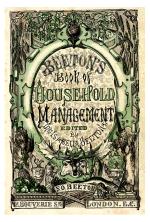 Edited by Isabella Beeton (Mrs.B) Isabella’s stepfather was clerk to Epsom Racecourse, she was educated in Germany and married the publisher Samuel Orchart Beeton. The Book of Household Management, which encompasses fashion, childcare, animal husbandry, medicine, the management of servants, science, religion and law as well as food was never claimed to be original, but was compiled by the Beetons from earlier sources, notably Eliza Acton. Isabella died in 1865, aged just 28.  Household Management online: FoodsOfEngland.co.uk Household Management online: FoodsOfEngland.co.uk Everyday Cookery online: Google Books Everyday Cookery online: Google BooksCassell’s Dictionary of Cookery A vast volume of definitions and instructions on more than nine thousand dishes. (Cassell 1883)  Online at: FoodsOfEngland.co.uk Online at: FoodsOfEngland.co.ukThe Skilful Cook By Mary Harrison Described by the author as “A Practical Manual of Modern Experience” (Harrison 1884)  Online at: FoodsOfEngland.co.uk Online at: FoodsOfEngland.co.ukHigh-Class Cookery Recipes By Mrs Charles Clarke A selection of “High-Class Recipes – as taught in the National Cookery School, Kensington” (National 1887)  Online at: FoodsOfEngland.co.uk Online at: FoodsOfEngland.co.ukThe Bread and Biscuit Baker’s and Sugar-Boiler’s Assistant By Robert Wells A useful book of advice to bread bakers, and the definitive source for many of the classic biscuit receipts. (Wells 1890)  Online at: FoodsOfEngland.co.uk Online at: FoodsOfEngland.co.uk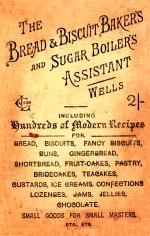 The Modern Flour Confectioner, 1891 By Robert Wells “Containing a large collection of recipes for cheap cakes, biscuits, etc., with remarks on the ingredients used in their manufacture: to which are added recipes for dainties for the working-man’s table”. (Wells 1891)  Online at: FoodsOfEngland.co.uk Online at: FoodsOfEngland.co.ukThe Encyclopedia of Cookery A vast dictionary, across seven volumes and around 2 1/2 million words, covering every aspect of cookery. (Garrett 1891)  Online at: FoodsOfEngland.co.uk Online at: FoodsOfEngland.co.ukEnquire Within Upon Everything A compendium of general information. (Enquire Within 1894)  Online at: gutenberg.org Online at: gutenberg.orgLa cuisine anglaise 1894 A French guide to classical English cooking, written at the height of France’s Belle Époque  Online at: FoodsOfEngland.co.uk Online at: FoodsOfEngland.co.ukLaw’s Grocer’s Manual Published from c1890-c1930 by Clowes & Sons of London, the manual remains an excellent source for basic definitions and information. (Law’s Manual)  https://archive.org/details/grocersmanualcon00felk https://archive.org/details/grocersmanualcon00felkOld Cookery Books and Ancient Cuisine By William Carew Hazlitt (Hazlitt 1902) Compiled by the grandson of William Hazlitt the essayists, this historical survey is highly entertaining, often informative, and frequently wildly inaccurate.  Online at: archive.org Online at: archive.orgGuide to the Art of Modern Cookery 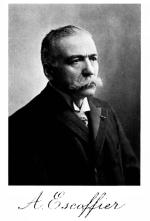 By Auguste Escoffier (Escoffier 1903) Although Escoffier is considered the man who, more than any other, defined French cuisine and made it truly great, this ‘Cook to Emperors and Emperor of Cooks‘ in fact spent most of his working life in England. Dishes associated with Escoffier in Foods of England include; Almond Custard, Bacon, Blancmange, Bookmaker Sandwiches, Cambridge Sauce, Cambridge Sausages, Chicken Devonshire, Chicken Pie, Crimped Fish, Cumberland Sauce, Cumberland Venison , Curry Sauce, Game Chips, Giblet Pie, Gloucester Sauce, Jubilee Cherries, Lady Curzon Soup, Lamb Cutlets Reform, Lord Nelson’s Cutlets, Oxford Sauce, Poularde Eduoard VII, White Windsor Soup  Online at: FoodsOfEngland.co.uk Online at: FoodsOfEngland.co.ukVine’s Savoury Pastry By Frederick T Vine (Vine 1900) Fully titled “Savoury Pastry: Savoury Dish and Raised Pies, Pork Pies, Patties, Vol-Au-Vents, Mincemeats, and Pies, and Miscellaneous Savoury Pastries. “. A compendium of baking techniques published by the ‘Baker and Confectioner’ magazine.  Online at: FoodsOfEngland.co.uk Online at: FoodsOfEngland.co.ukVine’s Shop Goods By Frederick T Vine (Vine 1907) Fully titled “Saleable shop goods for counter-tray and window – a practical book for all the trade”. A compendium of small cake, tart and pastries published by the ‘Baker and Confectioner’ magazine.  Online at: FoodsOfEngland.co.uk Online at: FoodsOfEngland.co.ukReform Cookery Book (4th edition) By Mrs. Mill (Mill 1909) A pioneering book of cookery based on ‘health foods’ and vegetarianism. In no way connected with the ‘Reform Club’ of Soyer.  Online at: FoodsOfEngland.co.uk Online at: FoodsOfEngland.co.ukPot-luck; or, The British home cookery book By May (Clarissa Gillington) Byron (Byron 1914) An extraordinary compendium of over a thousand recipes from old family manuscript books  Online at: FoodsOfEngland.co.uk Online at: FoodsOfEngland.co.uk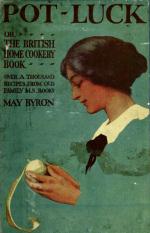 The Healthy Life Cook Book By Florence Daniel (Daniel 1915)  Online at: archive.org Online at: archive.orgGood Things in England by Florence White (White 1932) Florence White of London was a food writer and broadcaster who established the English Folk Cookery Association. ‘Good Things’ is a remarkable collection of receipts from ordinary people; “an attempt to capture the charm of England’s cookery before it is completely crushed out of existence”.  Online at: McGill University Quebec, Canada Online at: McGill University Quebec, Canada Cookery Illustrated & Household Management By Elizabeth Craig (Craig 1936) Craig began publishing cookery books after the end of World War I and proceeded through World War II and into the 1980s. She began writing in times when food was scarce and rationing was heavily relied upon, and her career ended when the majority of households had a refrigerator and an opportunity to access a much wider variety of foods: this can be observed in her writing as more diverse dishes appear in her later books. Food in England 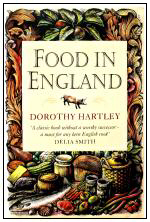 By Dorothy Hartley (Hartley 1954) Dorothy Hartley (1892-1985) spent a lifetime studying and recording English life, notably in her huge ‘The Life and Work of the People of England’. ‘Food in England‘ is a wonderfully readable, discursive book, full of anecdotes and asides as well as receipts. It is also well-speckled with errors, factual embelishment, poor research and faked histories. Described by Delia Smith as “a must for any keen English cook”. English Recipes and Others By Sheila Hutchins (Hutchins 1967) Hutchins was cookery editor of the Daily Express and published many books on the regional cookery of England English Food By Jane Grigson (Grigson 1974) Jane Grigson was food columnist for The Observer from 1968 until her death in 1990. Traditional Foods of Britain By Laura Mason and Catherine Brown (Mason+Brown 2004) A detailed survey of traditional foods, the UK’s contribution to the EU ‘Euroterroir’ project to catalogue Europe’s traditional foods. British Egg Information Service 1 Chelsea Manor Gardens, London (BEIS)  Website: www.britegg.co.uk Website: www.britegg.co.ukJ.Salmon County Series Cookbooks 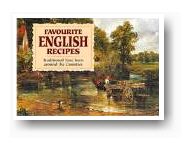 (J.Salmon) A delightful and well-explained series of small receipt books which are almost universals at tourist bookshops. Unfortunately, in order to make each County booklet the same size Messrs. Salmon seem to have moved a few receipts across borders and invented some ‘traditions’ of their own. Naughty, but more than one eating house has then picked up the inventions as genuine specialities of the region, effectively making them so. Tradition, I suppose, has to begin somewhere. Published by J Salmon Ltd, Sevenoaks  Publisher’s website: www.jsalmon.com Publisher’s website: www.jsalmon.comOxford English Dictionary www.oed.com (OED) The British Food Trust The British Food Trust was a charity with the expressed aim of stimulating awareness of British food and cooking. Its former website (now archived at https:///web/*/www.greatbritishkitchen.co.uk) was a significant source of food information, some of it useful but much of it magnificently incorrect. Created by cooks for their own reference. 1866 Mrs Hudson of Ledsham, Cheshire 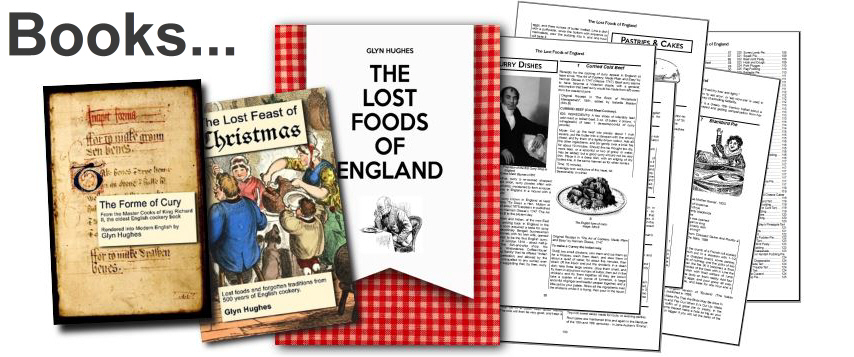 |
|
MORE FROM Foods of England... Cookbooks ● Diary ● Index ● Magic Menu ● Random ● Really English? ● Timeline ● Donate ● Royalty ● English Service ● Food Map of England ● Lost Foods ● Accompaniments ● Biscuits ● Breads ● Cakes and Scones ● Cheeses ● Classic Meals ● Curry Dishes ● Dairy ● Drinks ● Egg Dishes ● Fish ● Fruit ● Fruits & Vegetables ● Game & Offal ● Meat & Meat Dishes ● Pastries and Pies ● Pot Meals ● Poultry ● Preserves & Jams ● Puddings & Sweets ● Sauces and Spicery ● Sausages ● Scones ● Soups ● Sweets and Toffee ● About ... ● Bookshop ● Email: [email protected] COPYRIGHT and ALL RIGHTS RESERVED: © Glyn Hughes 2022 BUILT WITH WHIMBERRY |